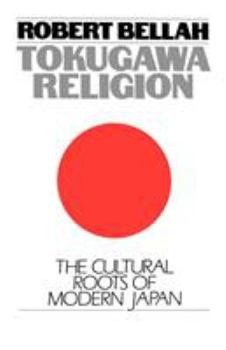Tokugawa Religion
Select Format
Select Condition 
Book Overview
Robert N. Bellah's classic study, Tokugawa Religion does for Japan what Max Weber's The Protestant Ethic and the Spirit of Capitalism did for the West. One of the foremost authorities on Japanese history and culture, Bellah explains how religion in the Tokugawa period (160-1868) established the foundation for Japan's modern industrial economy and dispels two misconceptions about Japanese modernization: that it began with Admiral Perry's...
Format:Paperback
Language:English
ISBN:0029024609
ISBN13:9780029024607
Release Date:September 1985
Publisher:Free Press
Length:272 Pages
Weight:0.71 lbs.
Dimensions:0.7" x 5.5" x 8.5"
Customer Reviews
3 ratings
Eye opener
Published by Thriftbooks.com User , 19 years ago
The author developed the ideas of this book in his Ph.D. dissertation at Harvard in the 1950s, and this book originally came out in 1957. The subtile was "The Values of Pre-Industrial Japan." Apart from the different subtitle and new introduction by the author, the 1985 and 1957 books seem exactly the same. Sociologist Bellah follows the foot steps of Max Weber, a German sociologist who explained, several generations before, that Northern European capitalism was strongly influenced by Protestantism (the religion of N. Europe for the last 500 years). Bellah similarly makes a strong argument that the industrialization of Japan had its roots in a very special religious ans pre-religious configuration. Though he comments about more ancient and more recent Japan, his focus period is the so-called "Tokugawa Period": 1600-1868. He feels that in this period Japan's religion and values had greatly stabilized compared to the upheavals of past centuries. The religion and values continued to evolve in the T period, but they were steadily leading to a concentration of politcal power in the person of the emperor. Japan's case is very different from N. Europe in may ways. Let me just mention one: for more than a 1,000 years before the T period, what is called Japanese religion had been a blend of Shinto, Confucianism, and Buddhism (and some Taoism). That blend always remained close to real life, through codes of ethics that were taken seriouly in day to day living. Bellah makes illuminating comparisons to China, and a couple of key comparisons to Europe that are also very illuminating. Why did I give such an important book 4 rather than 5 stars? First because I coudn't give it 4.5 stars. The half star I take off is to live some room for other books that are as important but also better written. The book is clear enough to be very well understood. Although I know a few authors that organize their material better and put more emphasis on concise sentences, one has to excuse Bellah for 1) dealing with a complex material often written in Japanese and 2) extracting a politco-econo-religious connection which too few social scientists have attempted. Highly recommended.
Tokugawa religion : the cultural roots of modern Japan
Published by Thriftbooks.com User , 19 years ago
Bellah begins by defining religion as "a set of symbolic forms and acts that relate man to the ultimate conditions of his existence." He argues that beginning with the single cosmos of the undifferentiated primitive religious worldview in which life is a "one possibility thing," evolution in the religious sphere is toward the increasing differentiation and complexity of symbol systems. His evolutionary religious taxonomy specifies five stages: primitive (e.g., Australian Aborigines), archaic (e.g., Native American), historic (e.g., ancient Judaism, Confucianism, Buddhism, Islam, early Palestinian Christianity), early modern (e.g., Protestant Christianity), and modern (religious individualism). In the modern stage of religious evolution, the hierarchic dualistic religious symbol system that emerged in the historic epoch is collapsed and the symbol system that results is "infinitely multiplex." In this posttraditional situation, the individual confronts life as an "infinite possibility thing," and is "capable, within limits, of continual self-transformation and capable, again within limits, of remaking the world, including the very symbolic forms with which he deals with it, even the forms that state the unalterable conditions of his own existence." read more: http://hirr.hartsem.edu/ency/bellah.htm An interesting perspective on Protestant Work Ethic applied / tested in other cultural setting.
excellent synthesis of sociology and history
Published by Thriftbooks.com User , 20 years ago
This text has become a classic in the fields of religion, history, and the social sciences. A great work by our greatest living sociologist of religion.






